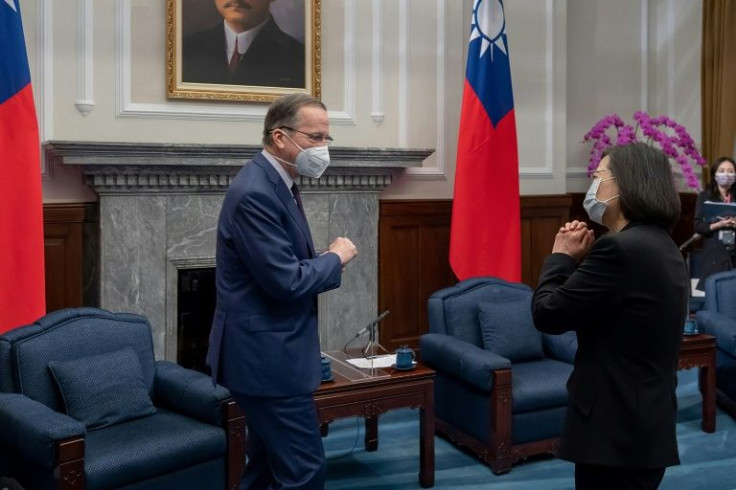Taiwan Doubts US Promises, Fears It'll Be On Its Own If China Invades: 'Ukraine Today, Taiwan Tomorrow'
KEY POINTS
- The withdrawal of troops from Afghanistan also raised worries in Taiwan
- Analysts said people thought as long as the U.S. military was close, they were safe
- Many think Putin's invasion is a direct challenge to U.S.’s deterrent capabilities
The impact of the Russian invasion of Ukraine is now being felt rather strongly in Taiwan, which now fears that its western allies won't come to its aid if China were to launch an invasion of the island.
Though the U.S. has reiterated that it would stand firm behind its security commitment to Taiwan, the Taiwanese are now worried whether the Biden administration would intervene in the event of a cross-strait conflict.
A delegation of former officials sent by the White House flew down to Taiwan last week in a show of support, but analysts and the general public now fear they would virtually be on their own if China acts aggressively — a conclusion they are drawing from the fact that U.S troops did not go into Ukraine to stop Russia.
Shao Zonghai, a Taiwanese political scientist from the Macau Polytechnic University, told the South China Morning Post that Biden’s insistence he would not send the U.S. military to Ukraine was a clear signal that Taiwan would face the same fate.
"Biden’s insistence on not sending the U.S. soldiers into Ukraine to participate in the war is actually a clear sign — the US doesn’t want to be involved in a direct conflict with Russia," Shao said.
"So if something happens in the Taiwan Strait, and when Taiwan faces severe challenges from mainland China, how can the United States jump out and send troops to Taiwan for military assistance?" he asked.
America's hasty and chaotic withdrawal from Afghanisthan have also added to the worries about Washington's commitment to its allies.
"Now, Vladimir Putin’s invasion of Ukraine has exacerbated all this anxiety as it is a direct challenge to Washington, and America’s deterrent capabilities. More directly stated, it leaves those in Taiwan pondering if Xi [Jinping] will now follow Putin’s lead in achieving a territorial objective that has until now been held in check," Allen Carlson, associate professor of government at Cornell University in the U.S., told the South China Morning Post.
Alexander Huang, a professor of strategy and wargaming at Tamkang University in Taipei, told Financial Times that "people thought as long as the U.S. military is close, we are safe."
The Ukraine situation, he said, has unnerved the public too that people now say "Ukraine today, Taiwan tomorrow."
"Taiwan sees that western countries are sending food and weapons to Ukraine but not coming in physically, and that is something the Taiwanese did not imagine before," Huang said.
"First it was Hong Kong, then it was the U.S,’s retreat from Afghanistan and now this. The effect is a lot of accumulated anxiety that has been brewing under the surface," he added.
Though many reports suggest that the aftermath of Russia’s invasion may prompt China’s leaders to think twice about taking over Taiwan, China's aggressiveness toward the island has not waned. On Monday, Beijing warned the U.S. against supporting Taiwan and trying to build a Pacific version of NATO.
The U.S. has for long maintained the 'One China policy,' under which it does not officially recognize Taiwan as a country, but has supported the island through defense aid.

© Copyright IBTimes 2024. All rights reserved.




















